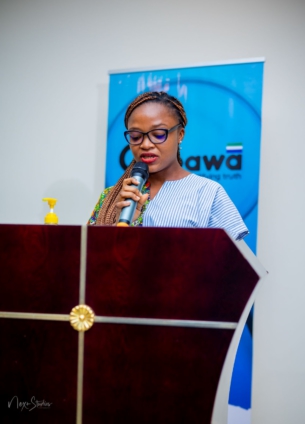Media and research professional Caroline Anipah, has contributed to the critical discourse on the growing issues of misinformation and disinformation, offering valuable insights and strategies to combat these challenges.
Drawing from her extensive experience in research and media, Mrs. Anipah joined Joy News’ AM Show via Zoom to shed light on the complex dynamics of false information. She carefully distinguished between misinformation and disinformation, underlining their unique characteristics and implications.
According to Mrs. Anipah, “Misinformation refers to information that is false but shared without the intention to cause harm.” In contrast, she defined disinformation as “false information deliberately created with the intention to cause harm, shape public opinion, and influence people’s behaviours.”
Highlighting the deliberate nature of disinformation, she remarked, “A lot of emphasis is put into creating disinformation, so it’s not always a mistake by someone. Across the world, disinformation tends to influence behaviours and impacts people’s democracy.”
Mrs. Anipah urged Ghanaians to be vigilant about emerging trends, particularly during sensitive periods such as elections. She noted that the proliferation of disinformation often leaves people unsure of how to interpret or handle the vast amount of information they encounter.
“We’ve noticed that people are increasingly uncertain about how to consume information because they believe there is disinformation everywhere. As a result, they stop tracking the sources of what they read. For instance, as we approach an election, people are confused about what they are hearing,” she said, referencing a recent case involving Wontumi FM to illustrate her point.
Mrs. Anipah emphasised that disinformation is a significant issue in Ghana that requires urgent attention. “I am glad that we are beginning to focus on this, and it’s encouraging to see a collective effort to address the problem,” she stated.
According to UNESCO’s LASP survey, 87% of respondents in a global survey expressed concerns that disinformation could influence elections in their countries with 47% being "very concerned."
Latest Stories
-
Bawumia visits assault victims in Ablekuma North rerun; pledges support
2 minutes -
Mahama charges Transport Minister and Attorney-General to resolve unauthorised shipping charges
6 minutes -
Mahama engages freight forwarders on 24-Hour Economy
6 minutes -
Ghana Armed Forces promotes young soldier who rejected galamsey bribe
1 hour -
NFFA elects Michael Kwetey Tetteh as its president
2 hours -
NPP outlines guidelines ahead of 2025 National Delegates Conference
2 hours -
Ken Ofori-Atta’s extradition: FBI clears first major hurdle – No witch-hunt
2 hours -
NDC executives deny involvement in rogue anti-galamsey taskforce
3 hours -
Bailiff jailed four years for forging judge’s signature
3 hours -
Presidency launches gov’t accountability series to enhance transparency
4 hours -
2024 Election: Bawumia’s early concession undermined results collation – Inusah Fuseini
4 hours -
Judge orders Trump administration to stop immigration arrests without probable cause in Southern California
5 hours -
What Ghana Must Fix: ISSER’s GSDO 2024 report exposes key social gaps in housing, jobs, and governance
5 hours -
“I want to help with ideas” – Socrate Safo to creatives in government
6 hours -
Prof. Nana Ama Browne Klutse: Championing environmental sustainability and youth employment in Ghana
8 hours

